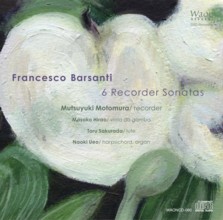
Mutsuyuki Motomura (recorder)
Masako Hirao (viola da gamba)
Toru Sakurada (lute, theorbo)
Naoki Ueo (harpsichord, organ)
Recording Data: March 13-15, 2007, Sagamiko Koryu Center, Kanagawa, Japan
Producer, Recording, Editing: Kazuhiro Kobusihi
Assistant director: Tomoko Teramura
Cover Design: Masako Saimura
WAONCD-080
Production: Waon Records
Since long ago, I have been fascinated by the late baroque type recorder. This type has three joints which make up a conical bore. It is used most widely now in our recorder world. But it is a pity if this popularity tends to make us blind to its real charms. In fact, it is a highly accomplished instrument developed by excellent instrument makers such as Bressan, the Stanesby family in England or the Denner family in Germany. It has many remarkable qualities; sweet and clear timbres, flexible expressiveness with subtle nuances and maneuverability suitable for virtuoso passagework.
When I thought of making a CD of the works which would fully convey those charms of the late baroque type recorder, Barsanti’s 6 sonatas (‘SONATE A FLAUTO, O VIOLINO SOLO CON BASSO PER VIOLONE, O CEMBALO’) came to my mind first of all. The opus is published in 1724 by none other than Bressan! Each sonata has its own character in a variety of styles; aria movements, dance movements, quaint contrapuntal movements, unconventional brilliant movements. Moreover, they are rich in both lyricism and virtuosity. They are certainly masterpieces of recorder music comparable to ones of Handel or Telemann.
Francesco Barsanti was an Italian composer and wind instrument player born in Lucca in 1690. He moved to London with Francesco Geminiani, a prominent violinist also born in Lucca. He was active mainly in the opera houses. Needless to say, London at that time was one of the great commercial centers of the world. It was also important in music publishing and opera performances, attracting many musicians from abroad. One of the most famous musician who flourished in London was Handel from Germany. But in reality, Italian musicians took important roles in the musical circle and Barsanti was one of them.
What we should not forget is that the recorder was enjoying its golden age in the early 18th century London. It began to bloom when an instrument maker Bressan and a recorder virtuoso Paisible moved there from France. It is exciting just to imagine how excellent the recorder players were who inspired Bressan or Stanesby to produce their exquisite instruments. Barsanti’s sonatas were created under those flourishing circumstances.
Barsanti moved to Edinburgh in 1735, after publishing the sonatas in this CD and traverso sonatas. There he composed concerti grossi and overtures and arranged Scottish tunes under the patronage of many aristocrats. He went back to London in 1743 and passed away there in 1772. Though most of Barsanti’s works are not well-known now, I hope this CD will give you something of what this talented composer left and delight of recorder music. (Mutsuyuki Motomura)
Click to listen the beginning 30-40 seconds of each track. (You can listen the whole track of one! )